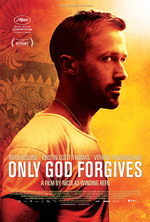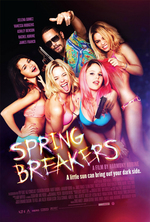Film Screening 4th October, 2013

Only God Forgives
8:00 PM, 4th October, 2013
- MA
- 89 mins
- 2013
- Nicolas Winding Refn
- Nicolas Winding Refn
- Ryan Gosling, Kristin Scott Thomas, Vithaya Pansringarm, Rhatha Phongam
While watching Only God Forgives you have the feeling that you’re witnessing the birth of a seminal, cult film. One of those films that, in five years, young men will hang reverential posters of in their rooms. It is a hyper-violent film, much of which is shocking, that depicts a series of underworld figures in Thailand who trade in the old warrior principles of honour, revenge and responsibility.
The God referred to in the title, as far as I could tell, never lived in this Bangkok. Directed by Nicolas Winding Refn, of Drive fame, Only God Forgives reunites him with Drive star Ryan Gosling in the lead role of Julian, the American with a murky past, who may not be the toughest fighter but has the clearest principles.
Winding Refn is a distinctive director, his earlier film Bronson is a classic example of spooky violence, and he has again made an individual motion picture. This is not to say it is perfect, there are far too many plot holes and pieces of absurd dialogue for it to be taken seriously. In one exchange Julian says to his femme fetale mother, “He raped and killed a 16 year old girl”. Her reply is the icy, “I’m sure your brother had his reasons”.
The audience I watched the film with shifted from laughing at the violence to disgust, and inevitably some left. However those that stuck it out to the end were, by the time the lights came up, talking about Only God Forgives with such passion that the few brave souls who started applauding were drowned out by the sudden rush of voices.
Carl Reinecke

Spring Breakers
9:44 PM, 4th October, 2013
- R
- 94 mins
- 2012
- Harmony Korine
- Harmony Korine
- Selena Gomez, Vanessa Hudgens, Ashley Benson, James Franco
Controversial filmmaker Harmony Korine returns for his fifth outing with the divisive Spring Breakers. A shameless study in gratuitous imagery, the film revels in its extensive exposition of nubile, semi-naked young adults. Although uncomfortable, this distinctively sleazy tone plays into the themes of hedonism and excess which pervade not only the idealisation of this party ‘paradise’, but the obsession with chasing the intangible American dream.
Spring Breakers centres on a gang of bored suburban college girls for whom spring break functions as a transcendent nirvana. The mantra ‘Spring break forever’ dictates their debauched celebrations, but as spring break winds down, their transgressive refusal to go back to their lives sees them become deeply embroiled in the dangerous world of local drug dealer, Alien (Franco).
A unique feature of Spring Breakers lies in its cast, who function as one of many overt references to celebrity culture and fallen idols. Spring Breakers picks apart the illusion of innocence which must have been a draw-card for the film’s all-star cast of former Disney ingénues. Aside from this telling move, Korine allows the film to play out without comment and while a focus on style over substance would normally devalue a film’s message, the gratuitousness, shallowness and intense visual beauty speak volumes about out contemporary popular culture landscape. The film ultimately resembles a drug-fuelled music video, and the disarming effect of this appropriation ensures the voyeuristic nightmare that is Spring Breakers will stay with its audience long after Spring Break(ers) is over.
Alice McShane